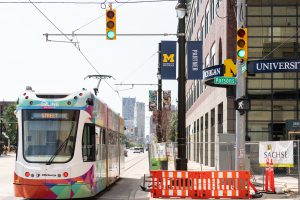News
U-M’s partnerships, initiatives in Detroit on the rise during pandemic
ANN ARBOR—The University of Michigan ramped up its collaborations on a multitude of projects in the city of Detroit during the pandemic, including outreach to residents on issues ranging from unemployment to the COVID-19 vaccine.
Initiatives such as Poverty Solutions, which created an Economic Mobility Partnership with the city of Detroit, and a partnership with four community organizations to help lower utility bills for residents are among a host of endeavors that touch on education, cultural expression, business, health care and the arts.
All projects are guided by U-M’s principles for engagement: emphasize recognition for the expertise and knowledge within the community; respect for individuals, communities and their resources; and equitable partnership focused on reciprocal relationships, transparency and accountability.

UM Detroit Center Images. Photography by Scott Soderberg, Michigan Photography
Since the onset of the pandemic, new and expanded projects include:
- More frequent, timely surveys from the U-M Detroit Metro Area Communities Study explored Detroiters’ views on the COVID-19 vaccine, unemployment, food access, eviction reform, and impacts of the pandemic and economic shutdowns. Led by Jeffrey Morenoff, professor of public policy and sociology and director of the Population Studies Center, and Elisabeth Gerber, professor of public policy, the citywide study has helped bridge the gap between Detroit officials and residents whose voices may not always be heard in public discussions.
- Research on food insecurity during the pandemic to help the city identify the most seriously affected areas and provide policy and technical recommendations. The research team includes HV Jagadish, professor of electrical engineering and computer science, and others.
- The Center of Finance, Law & Policy, housed in the Ford School of Public Policy, was awarded a grant from the Ralph C. Wilson Jr. Foundation for an emergency support program for small businesses in Detroit affected by the coronavirus pandemic. Of the free services U-M provided to 120 entrepreneurs in Detroit’s small business community, 85% are minority owned and 70% are female owned.
- A new project in partnership with four Detroit community-based organizations, will try to reduce the burden on residents who spend up to 30% of monthly income on energy bills. Led by Tony Reames, assistant professor of energy justice, team members will work with residents of 200 low- and moderate-income households in three Detroit neighborhoods—Jefferson Chalmers, Southwest Detroit and The Villages at Parkside—to improve home energy efficiency and lower monthly utility bills.
- “‘The Fierce Urgency of Now’: Communities Conquering COVID” was awarded a National Institutes of Health grant. The project is directed by Erica Marsh, associate professor of obstetrics and gynecology, and Barbara Israel, professor of health behavior and health education, in partnership with 16 organizations from Wayne, Genesee, Kent and Washtenaw counties, including four community-based organizations from Detroit that are also long-standing partners in the Detroit Urban Research Center. The partnership is using multiple strategies to address misinformation and mistrust around COVID-19, vaccine trials and the vaccine.
- Public art exhibitions for 2020-21 are held every three to four weeks and feature the work of Detroit artists and designers at the Michigan Research Studio/ArcPrep space on Selden Street, just off the corner of Woodward Avenue. The exhibits are curated by Nick Tobier, professor of art and design, and have featured the work of Yvette Rock, Made in Local and Stef-n-Ty.
- The Detroit River Story Lab began with grant-funded partnerships and several multidisciplinary courses devoted to the international waterway’s long and deep store of sustaining narratives, past and present. Led by David Porter, professor of English, the multiyear project spans both sides of the river and collaborates with many groups, including the Detroit River Project, Michigan Department of Natural Resources, National Park Service, Dossin Great Lakes Museum, Detroit Riverfront Conservancy and others.
- To address the high rates of infant mortality in Detroit alongside other health disparities, the Luke Clinic provides free prenatal, postpartum and infant care (through one year of life) to any family in the Detroit metro area.
- Poverty Solutions created the community-based research project Investing in Us: Resident Priorities for Economic Mobility in Detroit. It aims to provide policymakers, philanthropic organizations, nonprofits and other service providers with clear guidance on how Detroiters define economic well-being and what strategies they think will work best to increase economic mobility, which is the ability to improve one’s economic status.
The university’s engagement in Detroit, where it was founded in 1817, is driven by its public mission and is well aligned with the city’s areas of focus: economic mobility and growth, cultural expression and arts innovation, access to higher education, and healthy neighborhoods and community development.
The variety and volume of the efforts are a collaboration with Detroit’s neighborhoods, its community organizations and its residents. While the specific goals and partners of each effort vary, all of the work aims to help boost the vitality of Detroit and the region.
Contact:
Greta Guest, 734-936-7821, [email protected]
